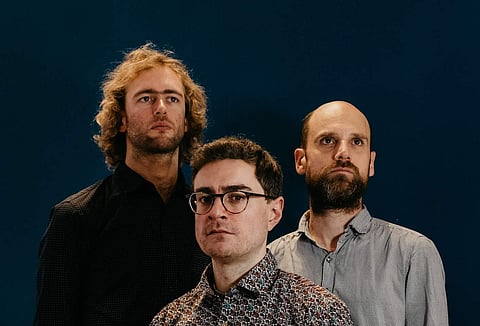Antoine Karacostas breaks down his unique mix of rebetiko, American jazz and Oriental sounds
With his origins in France and Greece, pianist Antoine Karacostas’ musical palette borrows from American jazz standards, traditional Middle Eastern sounds, Greek island life and everything in between. His trio, which comprises Gabriel Midon on double bass and Simon Bernier on drums, heads to the city this weekend to perform its tunes. The band has two albums under its belt already — Trails and Insulary Tales — and is already working on a new one. On his maiden trip to India, Paris-based Antoine talks to us about his unique style of music, his upcoming album and his love for jazz. Excerpts:
Tell us a little about your musical style.
Many jazz musicians and influences have shaped my style. Traditional Greek music is the meeting point between the East and the West. It can take different forms and to me, it represents the very image of nostalgia. Although I am passionate about the history of jazz, improvisation and the swing tradition, I am mainly influenced by the modal jazz of the ’60s. I think the harmonies and impressionism of modern music, especially French composers, can be felt in my writing.
Your sound is such an interesting mix of genres. How did you bring them all together?
The idea came to me a little before I started this trio. Jazz is inseparable from American jazz standards, many of which come from the repertoire of musicals. I love this repertoire. But not having grown
up in the culture of these pieces, it seemed more sincere to me to play pieces that touch me deeply.
My meeting with the singer Cybele Castoriadis (a rebetiko musician) made me want to
explore pieces from the Greek repertoire like rebetiko and traditional songs. The guiding idea has always been: keep the melody, but change everything around it!
What is rebetiko music?
Rebetiko is a bit like the Greek equivalent of the blues. It appeared in the 1920s in Greece and Asia Minor. It shares with the blues, especially at the beginning of its history, the themes of the underground, for example, unhappy love affairs, drugs, the police and uprooting. As the blues, it is in my eyes the fruit of the meeting of two musical worlds. Here, of the East and the West, of written music and improvisation, of Oriental modes and Western temperaments.
Which other artistes would you consider your inspirations?
There are many! Pianists for whom I have a special affection are Oscar Peterson, Herbie Hancock, Gerald Clayton and Aaron Parks. And I would also like to mention the composer Emmanuel Chabrier who is the very image of impressionism in music according to me.
What were some of the themes in your latest album?
I need to have images in my head before I look for a melody. It is like painting and colours. I cannot write a note without perspective. For the next album, through my personal compositions, I wanted to pay tribute to Greek islands in the Cyclades and Anafi, where I spent many summers. I felt that a page of my history was being turned in these islands. So I wrote pieces about real and imagined stories, encounters, sensations and places.
What is in the pipeline?
I’m in the process of finishing an album with a quartet — my trio augmented by Pierre Bernier on tenor saxophone. I had already invited him on two tracks on the first record of the trio, Trails, and I wanted
to make a whole record with this formula. The plan is to record a live album in Japan in the fall. I hope
that Covid will not delay the project again, and I hope to release the record in early 2023.
Rs 590 upwards. April 22 & 23, 9.30 pm. At Windmills Craftworks, Whitefield
anagha@newindianexpress.com
@anaghzzz

